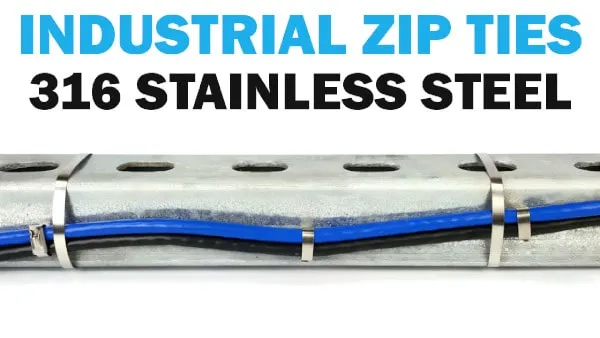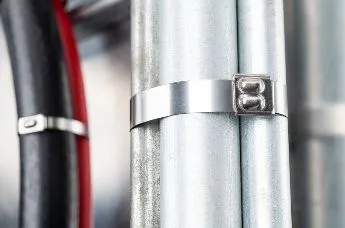Zip tie uses in the construction industry
What are zip tie uses?Have you ever wondered how constr […]
阅读更多
Zip ties, also called cable ties, are available in a wide range of shapes, sizes, and strengths to suit various tasks. However, for jobs requiring extra durability, heavy duty zip ties are the ideal solution. With so many options on the market, it can be challenging to determine which one is best suited for your needs and whether it offers the required strength.
If these are the questions you’re trying to answer, you’re in the right place. This guide will provide an overview of the strongest zip ties available, their ratings, and their common uses. By the end, you’ll know how to choose the perfect tie for your specific needs. Additionally, we’ll share resources to help address any remaining questions. Let’s get started by exploring how zip ties are categorized.


The strength of zip ties, also known as cable ties, is determined by their loop tensile strength (LTS). This measures the weight a tie’s locking mechanism can withstand once secured. To test this, a specialized machine fastens and tightens the zip tie before gradually pulling it apart until it breaks. The force required to break it is recorded and listed as the tie’s weight limit by most manufacturers. At wanducn.com, rigorous testing ensures their ties consistently meet these standards.
Cable ties are generally categorized into five strength levels based on their LTS:
It’s important to note that zip ties vary in thickness and material, which affects their strength and intended use. For instance, automotive zip ties typically have an LTS ranging from 18 to 250 pounds. These variations make certain ties better suited for specific applications, depending on their design and durability.
tie wraps metal, particularly those made of stainless steel, are the strongest type of cable ties available. Known for their exceptional durability, stainless steel tie wire can endure extreme conditions such as high temperatures, vibration, and even radiation. The metal shank, often the weakest part of a tie, is also reinforced in stainless steel versions, significantly enhancing their strength. At wanducn.com, the strongest zip tie can support up to 350 pounds, with custom options available for even greater strength. Nylon zip ties, while not as robust as metal ones, still offer impressive tensile strength, reaching up to 175 pounds.
Zip ties stainless steel are also highly resistant to environmental factors. stainless steel tie wire can last over five years under normal conditions and are ideal for outdoor use due to their ability to withstand UV exposure and harsh weather. For added longevity in outdoor applications, UV resistant coatings can be applied to prevent degradation from sunlight.
While nylon ties are less durable than metal ones, they remain a reliable choice for many tasks. Their lighter weight and cost effectiveness make them suitable for projects requiring moderate strength without the need for heavy duty materials.


tie wraps metal are rarely used in homes or offices. Instead, they are designed for demanding environments and heavy duty tasks, often outdoors. These ties are commonly employed to secure hoses, cables, or other components in industries such as automotive, construction, electrical, and offshore operations. In conditions where durability is critical, weight is substantial, and failure is not an option, tie wraps metal are the go to choice.
If you need a strong zip tie for a challenging job, we’ve got you covered. Our selection includes both nylon and zip ties stainless steel in various colors and sizes, with lengths up to 60 inches. To ensure you receive what you need promptly, we offer same day shipping and expedited delivery options.